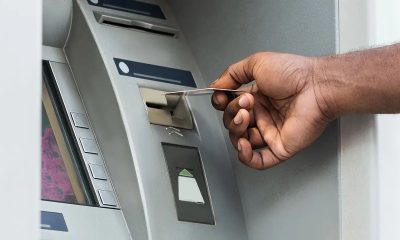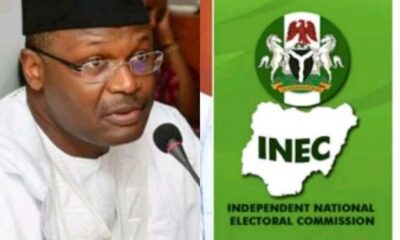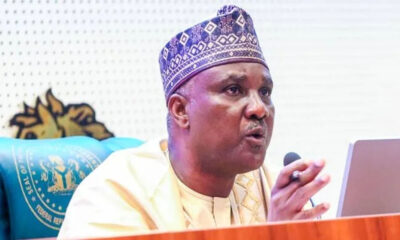Business
Budget: Reps worry over rising debt, N3.9tn for loans servicing
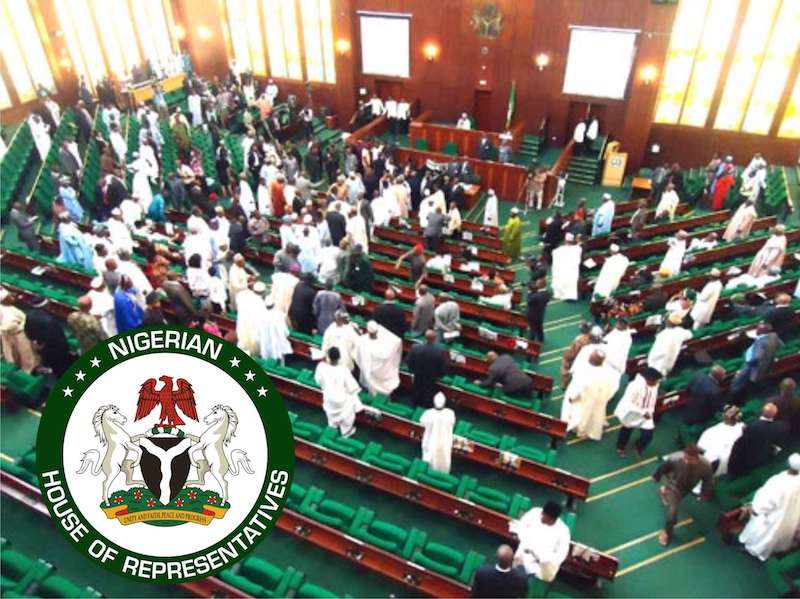
Members of the House of Representatives, Wednesday, picked holes in N16.39 trillion 2022 budget, saying it is riddled with unrealistic projections that could further hurt Nigeria’s economy.
The lawmakers, who spoke on Wednesday during budget debate at the plenary, expressed deep worry over deficit and borrowings incurred by the Federal Government, saying N3.9 trillion for debt servicing was disturbing, adding that by 2022, the total debt could hit N5 trillion.
While however asking for increase in the hazard allowance of doctors, the parliamentarians also sought upward review of crude oil benchmark per barrel.
This was as the members also noted that the allocation to Works Ministry should be increased by additional N500 billion.
Those who expressed this opinion included Hon. Onofiok Luke, Hon. Kabir Abubarkar, Hon. Leke Abejide, Hon. Mohammed Jega, Toby Okechukwu, Hon. Serguis Ogun amongst others.
In his contribution to the debate, Like said “Following from the above, there are plausible recommendations by the FG in the 2022 proposals which my constituents have asked me to share and then appreciate and look at it and commend it. One of them is the provision of about N50 billion for hazard allowance for medical personnel. We would recall that as part of the issues that led the medical personnel to go on strike is the hazard allowances which were not paid and even as of now those hazard allowances are quite very minimal.
“We commend this effort of the Federal Government to capture this. I believe that this would stem the tide of industrial action in the health sector in 2022.
“It is also commendable in the sense that we are still fighting COVID 19, we know that the Federal Government had paid for about three months Covid-19 allowance, and after that those allowances have not been paid. We know what medical personnel are exposed to daily, so there is need for them for to be paid these allowance so it can be a morale booster.
“We have had a lot of brain drain in the last few years, because our eggheads have been pushed to go into other climes because of the challenges we have here. So while we are commending Mr. President for this, there is need for us to up that hazard allowance from N5,000 which has been for over 20 years to something that will boost the morale of those medical personnel. So this is commendable but we can equally look at how we can increase the hazard allowance for medical personnel.
On Defence
“We also commended Mr. President for approving First Line Charge for National Agency for Science and Engineering Infrastructure. The world is going technology and we need to be in pace with how the world is moving and I want to commend Mr. President and commend the FEC for looking at this perspective to try to have a statutory transfer for the agency.
“The investment in Defence against the backdrop of the insecurity we are facing today is quite commendable, but what we would urge is that let there be a judicial use of these finances. We see in reportage every of our security personnel being hacked down by bandits in numbers. The question is what have we done to take care of their families and boost their morale. I believe the much funding in the 2022 proposed budget would take care of these issues.
“Before now, we have been crying for increased and improved welfare for Judicial officer and we have asked the Federal Government to try to increase the Statutory Transfer to the National Judicial Council so our Judges and Judicial Officers can be taken care of, our Courts can be equipped and then we can make provision for technology in our courts so that we can be at par with others and adopt best practices and be at par with advanced democracies that we see. The increase of statutory transfer by 10 billion to the National Judicial Council to take up the judiciary is quite commendable.
On Debt Service
“Another source of concern is that the proposal before us has a deficit of N6.2 trillion and government is proposing new borrowings to finance this deficit. What this implies is that then total public debt of Nigeria is expected to rise to N5 trillion in 2022 fiscal year. This is worrisome not only for today but generations unborn and the future of Nigeria.
“Let us do what we can to try to reduce the deficit and how we can reduce borrowing. Now to the next point on the issue so borrowing. There is nothing wrong with borrowing provided we borrow and put it for production not for consumption. So as we begin to look at it let us take the future generations of Nigeria into consideration while we get to borrow and make sure the borrowing are being put into productive ventures.
“While we put the money borrowed to infrastructure, three clear things come to mind. We have looked at security. We need to invest in power. Let us borrow to invest in power and roads. We have road challenges across the country. Let me use for instance Mr. Speaker, the Calabar-Itu road that area is being cut-off. People spend 8 hours on the road. And we have seen something less than a billion naira allotted to that road in the different lots that have been given. That is quite inadequate. We have to invest in our road and in our public transportation.
“We are talking about recoveries of loot and misappropriated funds, if we apply these it can help in reducing our deficits and borrowings. I don’t know whether these loots are still in the stomach of snakes or rats or animals. But if we apply these loots it would be to the better of the country.
“The pegging of oil price at $57 per barrel is totally quite very low. It is not sustainable. Permit to add that in the last three years since 2018, we have had a year high at an average of about $60 per barrel. So we should be advocating that there should be the upping of the pegging of $57 per barrel to $60 per barrel.
“In 2018, the year high was $77.41 cents per barrel. 2019 it was $66.24 cents. In 2020 it was $63.23 cent. As of today, the Brent is $83.27 cents. Bonny bright is $82.30 cents. So we can have an average of 60 dollars per barrel and that would be sustainable for us.
“The target of 13 percent inflation is not feasible, but what is achievable is that we should try to have a mechanism that would address the cost of food, cooking gas, and electricity bill. In this case, there should be provision for meters and we should make sure we cater for Nigerians in this regard”.
Increase allocation to Works
The Chairman, House Committee on works on Kabir Abubakar urged for upward review of proposed fund for road projects.
“The Tax Credit Scheme, where companies are allowed to develop road infrastructure and they are giving tax holidays to the tune of the cost of the project. An example is the Apapa – Oworoshoki Expressway in Lagos and the Kabba – Obajana road in Kogi state by Dangote. Other companies like LNG, Flour Mills, MTN and recently NNPC have all indicated their interest to participate in the Tax Credit Scheme.
“And also, the HDMI, where major highways are given as a concession to Investors to maintain and rehabilitate the roads and also, invest in the assets along the roads.
“Mr Speaker, over 800 contracts for roads and bridges are currently being executed across the nation by this Government, covering over 13,000 Kilometres of the 35,000 plus Kilometres of Federal Highways and Bridges. Every state in the federation has either a road or bridge project going on. To complete these projects, the Federal Government will need over 7 trillion Naira.
“But the 2022 budget provision for the Works sector in the Federal Ministry of Works and Housing from my sources at the Ministry is less than N300 billion Naira for capital allocation. While the federal government is owing road contractors over N400 billion.
“Mr Speaker, this allocation is grossly inadequate and a child’s play. Critical road projects in the 2022 budgets, in some cases, are allocated less than N400 million while the contract sums are above N40 billion and the contractors are owed billions of Naira”, he said.
$57 oil benchmark per barrel very low – Abejide
In his contribution, Hon. Leke Abejide said that the oil price benchmark should be reviewed.
“I have a little concern about the issue of borrowing. Once the capital projects are executed which will lead to economic growth and subsequently economic development; once it is channelled through these capital projects, we are going to achieve results. Where I have little worry is about the key assumptions and parameters of the budget. Not all assumptions but majorly the figure of crude oil per day which is put at 1.8million. During our MTEF hearing, the GMD of NNPC appeared before us -House Committe on Finance-he said that average production ranged between 1.6 to 1.7 million barrels per day. In projection, it is always good to be realistic. If you take the average of 1.7.mbpd, I think it is more realistic than going higher, because once there is a shock, it will be difficult for us to remedy it. It is always good not to be too ambitious. And I am talking about the production per day. These are areas I think we should look at. I think it is over ambitious to put it at 1.8mbpd.
“Secondly, the benchmark of $57 per barrel, if you look at the world market today, it is above $80. So, I think this is a bit low. If you can look at it, not to be too over ambitious also, may be we should take it above $60 per barrel. I think th is a bit realistic. If you look at the trend in the last two years, it has never gone down below this price”, he said.
Budget deficit my concern- Jega
Also speaking, Hon. Mohammed Jega said that his concern was on the budget deficit.
“I am concerned most especially on how to reduce the deficit. We will advise our colleagues in the House Committee on Finance to engage the revenue generating agencies to be more effective and account for every revenue collected so that we will be able to reduce deficit”, he said.
We can’t overcome with N3trn debt servicing – Okechukwu
Similarly, the deputy minority leader of the House, Hon. Toby Okechukwu also decried over N3 trillion allocated to debt servicing.
“This budget of economic growth and sustainability as presented by Mr President, it will appropriate to say that in 2020 there was complete implementation of the budget. We in 2014 had a budget of about N4.8 trillion , in 2022 we have a proposed bill of N16.3 trillion. If we do the mathematics as per the exchange rates of the Naira, those same money in spite of the quantum of 16 trillion as against the 4 trillion all get down to 40 billion dollars. It’s all motion no movement. It’s very instructive that in subsidy regime which is being baptized as under recovery is hurting the economy big time. We need to deal with it. It’s a matter of living in denial to continue to subsidize petroleum.
“We have over 3 trillion for debt servicing and more than 6 trillion for recurrent expenditure, this means that whatever that is going to capital expenditure if you take TETFUND and these agencies away, it’s about 2.8 trillion. There’s no way we can continue to commit that level of fund to recurrent expenditure and to debt servicing and we shall overcome”, he said.
On his part, Hon. Serguis Ogun said that budget implementation in Nigeria has never been satisfactory.
He said “Mr speaker, nobody is satisfied with budget implementation in this country. Ok, my point is if we review the budget quarterly we might be able to get the MDAs to respond more, the budget will be implemented in line with our expectations”.
Also speaking, the Leader of the House, Hon. Ado Doguwa called on government to invest in infrastructure.
“This budget as highlighted by Mr. President, I want to believe that the figure may have sounded quite very extraordinary-N16.39 trn. I believe that this is the highest figure we have ever had in the course of my engagement for the money bill. But I want to believe that honorable members will accept the fact that, with the changing economic situation and with the rising economic challenges and demands by our people, and in order for us to address the infrastructure deficit in the country, we will also be able to engage some of these new issues-health issues-the COVID-19 pandemic, there is the need for the government to invest heavily in infrastructure in this country”, he said.
No allocation for erring MDAs-Elumelu
In his intervention, the Minority Leader, Hon. Ndudi Elumelu urged all the standing committees to ensure zero allocation to Ministries, Departments and Agencies, MDAs that failed to implement their capital projects in the previous budget despite 70 percent releases.
“I will not go into criticizing and saying anything ordinary, other than to charge our committees. If you recall we passed a resolution urging our standing committees to be up and doing by going to find out which project that have been implemented and kick started to enable us know what to do in the estimate that has been presented to us. So I expect the standing committees should live up to expectations and ensure that assignment is concluded and that will inform what we are going to do in terms of the budget going forward.
“My worry is about the loan but like someone submitted, the person said there’s nothing wrong about loan but when loan is taken it should be for a good purpose. With emergence of COVID-19,This budget should be able to address those abnormalities before us, by ensuring that our medical centers are up to date with infrastructural technology required. I see no reason why this National Assembly should patronize such agencies, if we find out that truly, they have not done anything to the previous budget. I submit that this National Assembly should not for any reason give money to that agency”, he said.
Vanguard
Business
Dangote Refinery: MRS, other filling stations increase petrol price
Dangote Refinery: MRS, other filling stations increase petrol price
The price of petrol has surged to N930 per litre in Lagos and N960 in northern states, following the recent suspension of naira payments for crude oil by the Dangote refinery.
MRS filling stations implemented the new pricing structure on March 28, 2025, marking a N70 increase from the previous rate of N860 in Lagos and N80 higher than the former N880 in the North.
Other fuel retailers have also adjusted their prices, with NIPCO reportedly selling at N930 per litre in Magboro, Ogun State, on Saturday.
According to MRS Oil & Gas, trucks will load products from its Lagos depot and distribute them across the country at varying costs.
The company’s latest pricing document confirms that Lagos has the lowest fuel rate, while northern states face the highest prices. However, the company did not specify whether it sourced its supply from the Dangote refinery.
Under the revised price framework, petrol now costs N930 per litre in Lagos, N940 in other South-West states, and N960 in the South-South and South-East regions, including Edo, Abia, Akwa Ibom, Bayelsa, Rivers, Cross River, and Enugu.
READ ALSO:
- Ex-Rivers HoS wife cries for help over husband’s safety
- Fubara reacts as Ex-HOS, Nwaeke accuses him of bombing oil pipelines, Rivers Assembly
- Natasha: Emmanuel Uduaghan threatens to sue Senator Nwaebonyi
In the North, Abuja, Kaduna, Benue, Kogi, Niger, Sokoto, Kebbi, and Nasarawa will pay N950 per litre, while Zamfara, Kano, Jos, Bauchi, Taraba, Adamawa, Borno, Katsina, Jigawa, Gombe, and Yobe will pay N960.
The Free Carrier Agreement (FCA) price, which determines how much marketers pay before reselling fuel, also differs by region. Lagos has the lowest FCA price at N905 per litre, whereas states like Borno, Taraba, Adamawa, and Yobe have FCA prices around N888 per litre.
The recent suspension of the naira-for-crude initiative by the Dangote refinery was attributed to discrepancies in crude oil allocation. Sources indicate that the Nigerian National Petroleum Company Limited (NNPCL) allocated large volumes of crude to foreign creditors to settle outstanding loans, making it difficult to sustain local transactions in naira.
As a result, independent fuel importers have taken advantage of the situation, increasing depot prices. Industry analysts warn that the rising petrol costs could drive up transportation fares and the prices of goods and services.
Experts suggest that prices may stabilize once the Dangote refinery secures a reliable crude oil supply from NNPCL and resumes selling in naira. Until then, consumers across the country will have to contend with higher fuel costs.
Dangote Refinery: MRS, other filling stations increase petrol price
(PUNCH)
Auto
Lanre Shittu Motors to endow Automobile Department of Lagos Technical College

Lanre Shittu Motors to endow Automobile Department of Lagos Technical College
Lanre Shittu Motors has announced a novel idea that will boost automobile studies in a Lagos technical college.
Specifically, it has pledged to adopt the Automobiles Department of the Government Technical College, Aso-Soba in the Festac area of Lagos.
This is intended to raise academic and practical programme standards of the school.
The company said this would involve adequate funding, in-school training and intensive industrial training (IT) with welfare package to encourage more young people to pursue academic career in automotive engineering.
Business Support/Admin Manager of LSM, Mr Babatunde Adenuga, disclosed this in Lagos, in an interview with journalists.
Adenuga represented the LSM Managing Director, Mr Taiwo Shittu, at the just concluded Engineering Week of the college sponsored by the auto company, where he unveiled the plan to the staff and students at the event’s grand finale.
Aside from the needed financial support to make the auto department functional and standard, he said LSM would provide the tools, overall wears/workshop uniform, among others, as part of the welfare package for the students.
He said it would be a win-win situation for the school and the company.
Adenuga said, “The school will benefit immensely from the LSM package for the department as we take the financial trouble of running the department away from them.
“Students from the department can come for their internship at LSM workshops, and getting jobs after school won’t be difficult.
“For us, it will be a seamless arrangement in getting suitable personnel familiar with our training and business orientation.”
He also said the LSM had been absorbing students from the school and others for their industrial training (IT), providing them with useful hands-on training and monthly stipend to keep them going.
The LSM MD, Taiwo Shittu, commenting on the support, said, “We’ll be part of the progress of the school. We want to own a department in the technical college, the automobile department of studies that will enable us to fund the place; take care of the welfare of students, providing the tools, overall uniform and other facilities.”
“At LSM, we see training the youths as part of our Corporate Social Responsibility. Every year, we take in youths into our facility and train them; even while in training, we give them stipends.”
The highpoint of the LSM-sponsored Government Technical College event was the presentation of prizes to outstanding students in the various competitions held for the Engineering Week.
Three of the students whose projects stood out such as locally produced water pumping machine and water heater went home with impressive cash awards.
Principal of the college, Mr Folarin Sunkanmi, expressed appreciation to LSM for the interest in the school, starting with giving the students the opportunity for industrial training and offering them monthly stipend.
The principal commended the LSM efforts of sponsoring the engineering week’s activities, whose theme was given as ‘Engineering for Sustainable Development (Innovators of tomorrow)’
He urged other companies to emulate the LSM example in order to boost the employability chances of products of the technical colleges and engineering departments of higher institutions in the country.
Business
Elon Musk sells X to AI startup for $33 billion

Elon Musk sells X to AI startup for $33 billion
Billionaire entrepreneur Elon Musk has announced the merger of his artificial intelligence startup, xAI, with his social media platform, X, in an all-stock transaction valued at $45 billion.
This move brings xAI’s valuation to $80 billion, while X is valued at $33 billion.
Both xAI and X are privately held entities under Musk’s control.
The two companies share notable investors, including Andreessen Horowitz, Sequoia Capital, Fidelity Management, Vy Capital, and Saudi Arabia’s Kingdom Holding Co.
Musk, in a post on X, stated that the merger would combine their data, computing power, distribution, and talent to create more advanced AI-driven experiences while staying committed to their core mission of truth and knowledge advancement.
“@xAI has acquired @X in an all-stock transaction. The combination values xAI at $80 billion and X at $33 billion ($45B less $12B debt).
Since its founding two years ago, xAI has rapidly become one of the leading AI labs in the world, building models and data centers at unprecedented speed and scale.
READ ALSO:
- Barbaric mass burning of innocents in Edo, by Farooq Kperogi
- Investigation of wanted businesswoman Achimugu not linked with Atiku, Sanwo-Olu – EFCC
- No Sallah durbar festival in Kano this year – Police warn
X is the digital town square where more than 600M active users go to find the real-time source of ground truth and, in the last two years, has been transformed into one of the most efficient companies in the world, positioning it to deliver scalable future growth.
xAI and X’s futures are intertwined. Today, we officially take the step to combine the data, models, compute, distribution and talent. This combination will unlock immense potential by blending xAI’s advanced AI capability and expertise with X’s massive reach. The combined company will deliver smarter, more meaningful experiences to billions of people while staying true to our core mission of seeking truth and advancing knowledge. This will allow us to build a platform that doesn’t just reflect the world but actively accelerates human progress.
I would like to recognize the hardcore dedication of everyone at xAI and X that has brought us to this point. This is just the beginning,” he stated.
xAI’s growing footprint in AI
Founded less than two years ago, xAI aims to “understand the true nature of the universe.” The company has been developing large language models and AI tools, positioning itself as a direct competitor to OpenAI, a company Musk co-founded in 2015 before exiting due to strategic differences.
In June 2024, xAI announced plans to build a supercomputer in Memphis, Tennessee, to train its AI chatbot, Grok. By September, Musk revealed that part of the Memphis-based supercomputer, called Colossus, was already online.
xAI’s rapid expansion has drawn scrutiny from environmental and public health advocates, who cite a lack of community input in its Memphis project. The Colossus supercomputer is powered by natural gas-burning turbines, and xAI plans to expand operations with a nearby graywater facility.
Elon Musk sells X to AI startup for $33 billion
-

 Uncategorized2 days ago
Uncategorized2 days agoBreaking: Moon sighted in Saudi, UAE, others, Eid-Fitr holds Sunday
-
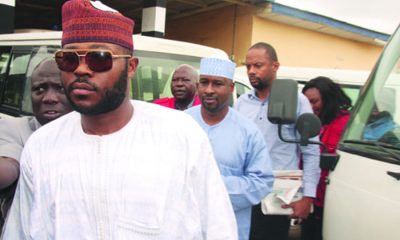
 metro3 days ago
metro3 days agoEFCC re-arraigns son of ex-PDP chairman for alleged N2.2bn oil subsidy fraud
-

 metro1 day ago
metro1 day agoRamadan ends in Nigeria, Sultan announces March 30 as Eid-el-Fitr
-
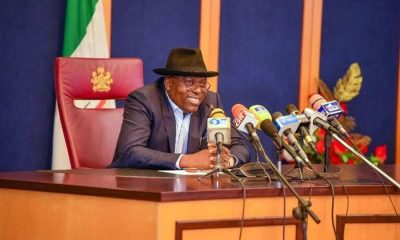
 metro2 days ago
metro2 days agoFubara reacts as Ex-HOS, Nwaeke accuses him of bombing oil pipelines, Rivers Assembly
-
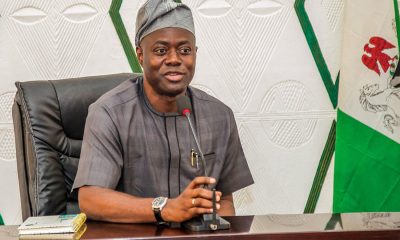
 metro3 days ago
metro3 days agoWe welcome Gov Makinde’s U-turn on Shari’ah panel – MURIC
-

 Opinion2 days ago
Opinion2 days agoBarbaric mass burning of innocents in Edo, by Farooq Kperogi
-

 metro2 days ago
metro2 days agoEx-Rivers HoS wife cries for help over husband’s safety
-

 Uncategorized3 days ago
Uncategorized3 days agoObasanjo’s position on Rivers emergency rule hypocritical, says Presidency

